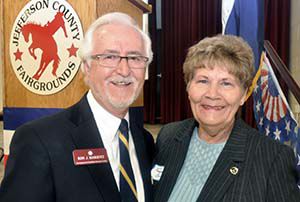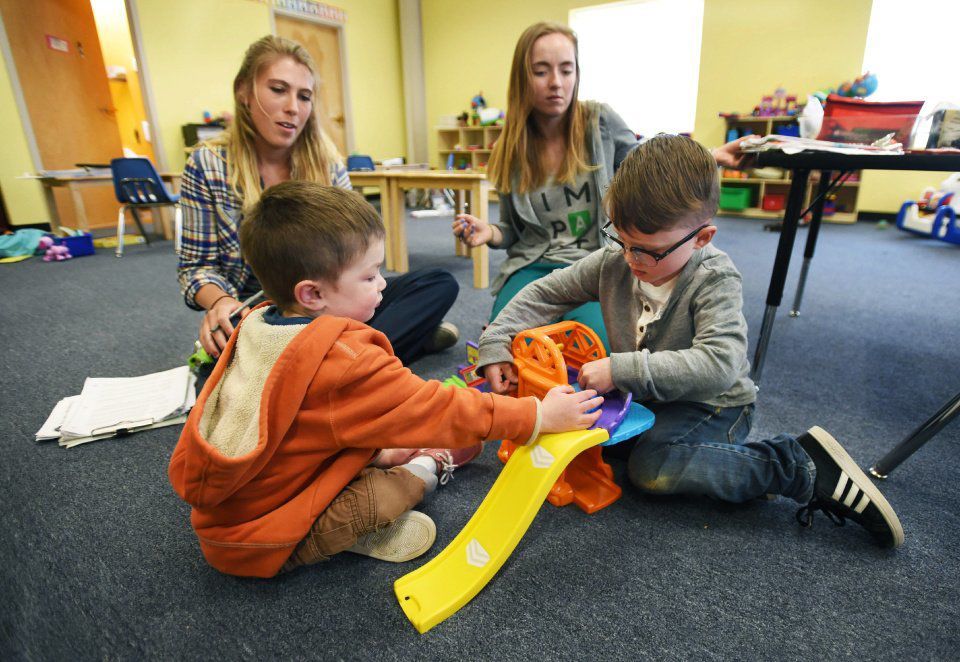Nonprofit groups host legislative barbecue

More than 300 clients, family members and caregivers involved with a host of nonprofit groups that serve Jefferson County had the chance to talk over plates of barbecue with lawmakers and candidates on Tuesday evening at the fairgrounds.
For the 12th year running, four large community service organizations — Developmental Disabilities Resource Center, Jefferson Center for Mental Health, the Seniors’ Resources Center and The Family Tree — invited those who benefit from their services and those who might have a say in how those services are delivered to share stories and talk policy.
It’s not just programs and statistics and reports, said Lynnae Flora, deputy director of Jefferson County Human Services, which works with the nonprofits — and more than a hundred others — in an effort to serve residents. “It’s real,” she said.
“This is a great gathering of folks where we bring people who have received mental health and other services and people who have delivered those services,” said state Sen. Andy Kerr, D-Lakewood. “It’s a great evening.”
Kerr was among the nearly 30 elected officials and candidates — running for everything from county offices to the Legislature to Congress — who each took a couple minutes to address the crowd, but he noted before the speeches started that it’s the conversations at the dinner tables that keep him coming back.
“This barbecue makes sure the elected officials realize and are aware of how the system works. When we’re voting on important things like funding for things like mental health services, we realize how important those votes are,” he said.
Former state Sen. Tim Neville, R-Littleton, said he recognized plenty of faces from his year in the Senate and understood the importance of boosting the economy in order to help the nonprofits serve residents.
“The nonprofits are feeling the same issues and the same problems with the economy as everyone else,” said Neville, who is challenging state Sen. Jeanne Nicholson, D-Black Hawk, in the November election.
“A rising tide floats all boats, so one of the biggest things we have to do is to develop an opportunity economy again. It’s going to tremendously help nonprofits as well. Unfortunately, when things go down, like they have in the last few years, you run into a situation where the need is greater and the resources are less. We really need to get this economy going and eliminate the impediments to that,” Neville told The Colorado Statesman.
Beverly Winters, the new executive director of the DDRC — the organization oversees community-based services for more than 3,000 children and adults with developmental disabilities in Jefferson, Gilpin, Clear Creek and Summit counties — thanked legislators for adding additional funding last year to cut down on the nonprofit’s waiting list. She also pointed to last year’s House Bill 1051, which outlines a plan to eliminate waiting lists — historically, the waits have been as long as 15 years in Colorado — for every state resident with intellectual and developmental disabilities by the end of the decade.
The life expectancy of the people DDRC serves has increased substantially in recent years, she said, marking both a success for the program and increasing demands on funding. One lady, she noted, is in her 90s, lives in a host home “and is thriving.”
John Zabawa, president of the Seniors’ Resources Center, pointed out that Jefferson County has the largest population of older residents in the state, with nearly one in five residents over age 60, a share expected to grow by more than 50 percent by 2020. Those over the age of 85 are the fastest growing segment of the adult population, he added, living longer and well into their late 80s and 90s.
“The Seniors’ Resources Center,” he told the crowd, “has the distinct pleasure of providing services to one individual who is 102, still lives at home and loves to garden. She is really able to enjoy that independence and be as self-sufficient as she can.”
The center works on everything from transportation — providing more than 130,000 rides to seniors last year, many driven by volunteers — to adult day care, respite care to give caregivers a break, in-home care, work on mental health issues. A new project involves helping seniors who want to stay in their homes — a recent survey shows that some 90 percent prefer that — catch up on neglected home improvements.
Calling the Jefferson Center for Mental Health a “critical part of the community’s safety net,” executive director Harriet Hall noted that one in five residents will experience mental health problems over the course of their lives. “We know that early intervention is important and that treatment works,” she said.
The mental health center is seeing a tremendous surge of new clients — “record setting and significantly higher than anything we’ve ever experienced,” Hall said — in the wake of the state’s expanded eligibility for Medicaid and increased health insurance coverage among the general population.
“Most months, about 500 new people come through the door seeking services,” she said, not including those the center contacts at community outreach events. Overall, the center served or had contact with more than 23,000 people last year.
Events like the legislative barbecue, she added, help underscore the importance of what the center provides. “Mental health services are vital to the health of our community,” she said.
Scott Shields, director of The Family Tree, emphasized how interconnected the problems are that the nonprofits face, requiring open communication and tight coordination.
The statistics he cited were sobering. In 2012, he said, more than 5,300 women and children fled their homes because they were no longer safe in Colorado, and Family Tree provided shelter to more than 500 of them. Last year, the Jefferson County school district counted more than 2,500 homeless students among its ranks. Last year, state officials counted 8,200 calls reporting child abuse and neglect.
Family Tree’s mission — unique in its scope — is to tackle child abuse and neglect, domestic violence and homelessness, in part because each can lead to the others. “These are not disparate, disconnected issues at Family Tree,” Shields told the crowd.
It’s key to the approach taken by Jefferson County Human Services.
What the community service organizations are striving for, Flora told The Statesman, is interconnected, seamless care to residents. “If you walked in the door, you would not know who works for who,” she said. “All you would know is you were getting served when you needed help.”
— Ernest@coloradostatesman.com
See the Sept. 19 print edition for full photo coverage.
Colorado Politics Must-Reads:



















